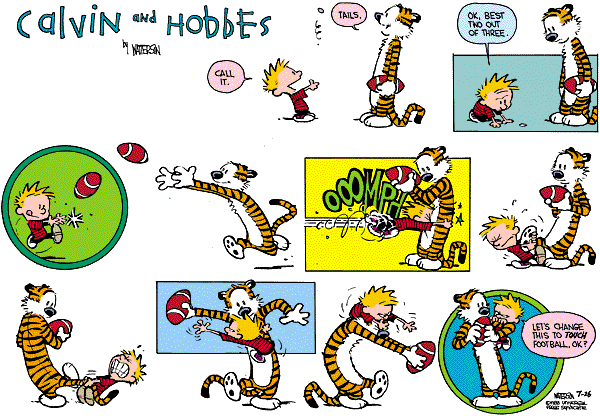Sportsmanship
This past week the topic I have been attempting to read about is sportsmanship. Sportsmanship is generally understood to be about the character of the participants of sports while engaged in their game. Take Lucy and Charlie Brown for example. Lucy tells Charlie that she will hold the football for him to kick, but every time he draws near she wisks the football away allowing the momentum of Charlie’s kick to carry him off the ground and land him on his back. With regards to sportsmanship, it would be said of Lucy that she characterized unsportsmanlike behavior by not holding the ball, or she simply cheated. That is a primary concern about sportsmanship, whether or not you follow the rules. There are other things too, but that’s the oversimplification of sportsmanship.
Truth be told, none of the articles I read were fascinating enough to inspire me to write about them. Nevertheless, there was one article that is sufficient enough to help me with this blog. Peter J. Arnold’s “Three Approaches Towards an Understanding of Sportsmanship” was the clearest of the articles I read. As his title states, Arnold looks at sportsmanship from three different perspectives, which are not mutually exclusive. He looks at sportsmanship as a (1) form of social union, (2) provider of pleasure, and (3) form of altruism. I shall discuss each of these areas as I understand them, but it is important to know, according to Arnold, “what must be emphasized is that fairness, if understood only in a legalistic or formal rule-following sense, can only be regarded as a necessary condition of sportsmanship, but by no means a sufficient one.” In other words, there is more to sportsmanship than playing by the rules.
Social Union
Sports are commonly held to be a social activity, so it makes sense that sportsmanship

Australia’s Pendleton took England’s Meares by pleasant surprise when she embraced her long-time rival after winning gold knowing Meares planned on retiring. What an excellent example of the social union form of sportsmanship.
can be perceived as a form of social union, uniting players in a common cause; namely “the preservation and continuation of its [sports] best traditions, customs, and conventions.” This is done so that everyone can feel equal as participants in the game they engage in. But sportsmanship is more than playing by the rules, it is a way of life that deserves to be maintained and displayed as it demonstrates “cooperation and mutual satisfaction.” But for this way of life to excel among participants there must be something more than following the rules. There must be a genuine commitment to uphold and embody the values of fellowship and goodwill. These values must be greater than the desire to win and the feeling that accompanies victory. With these values players and officials can come to together and, ideally, participate without complications or contentions.
Promoting Pleasure
Here Arnold gives less his own opinion with regards to sportsmanship as a means of promoting pleasure as he debates the opinion of another author. Nevertheless, the overall message that Arnold permits to be presented is that sports have the propensity for fun and diversion. But overall, sports promotes a feeling of magnanimity and generosity. I felt cheated when reading this section of Arnold’s article since there was little else but why someone else was mistaken instead of how he thought sportsmanship was a form of promoting pleasure. How can I understand his point of view if it is never mentioned. By the title I would think that sportsmanship allows players to enjoy the game by not worrying about someone breaking the rules or behaving poorly. Like a comic strip of Calvin and

Sports are meant to be fun. That’s why sportsmanship is so important. If players abide by the fellowship and morals that accompany sportsmanship (similar to the social union aspect) than everyone is able to enjoy the game.
Hobbes where the two are playing Calvinball. They started with one game, but not knowing how to play they evolve the sport into something new but maintain the spirit of sportsmanship as a means of promoting pleasure. Whatever the sport, sportsmanship upheld by all players makes the sports much more enjoyable.
Altruism: the unselfish concern for others
Speaking of sportsmanship as a value to uphold, naturally that value would tend to be something like altruism. When speaking about the altruistic values associated with sport, Arnold pay particular attention to the moral sense to go beyond the obligation to follow the rules. It is important to remember that altruism, in the sport sense and as defined by Arnold, “is a genuine concern for an interest in and concern for one’s fellow competitors, whether on the same side or in opposition.” This speaks to me particularly because of my personal belief of altruism permeating my entire life. I also reflect on my time in sports as a kid and my adult life watching sports and participants, noticing instances of altruism on and off the field. But more on that later. Arnold states that there are least two ways in sports that someone can go beyond the simple obligatory obedience to the rules.
One way is to act selflessly, even to the point where you could jeopardize your chances in

There are at least two ways to demonstrate altruistic sportsmanship and one of them is to act out of concern for someone else even at risk, cost, or sacrifice to oneself.
winning the competition. The picture displayed here is a visual of the example that Arnold provided; that of a runner helping a fellow competitor in a state of distress even at the cost of her own victory. If you have ever witnessed one of these types of scenes you will know that this person is considered a victor in a different sense. Her actions are applauded, her feeling of accomplishment greater than the person who actually won the competition. Such is action is going well beyond obedience to rules, but exemplifies the type of people we want to call heroes, true sportsmen. Another way in which altruism in sports can be demonstrated is by “acting on behalf of another so that more good is brought about than id one had merely acted in accordance with the rules.” As Arnold indicates, performing a generous act on behalf of another is just one more way to be altruistic. The amazing thing about this method is how often such acts go unnoticed, which makes all the more impactful. Acts such as asking for a fellow competitor to have an extended break time to recover from their previous event, or even confessing to an act that negatively impacts, such as correcting a referee who called the ball out on your competitor even when you know it hit your foot on the way out. Alturistic sportsmen are not only sympathetic to the plight of another but are willing to do something to improve that other person’s situation, even if it means it hinders their chance of victory.
Again, I use the example of Calvin and Hobbes. The two are playing football, but because Hobbes is much bigger than Calvin,

Had Hobbes demonstrated altruism, he, instead of Calvin, would have recommended that they play touch football so that Calvin has a more equal chance.
he is unphased by Calvin’s attempt to tackle him. Calvin suggest changing the game to touch football, to make more fair, but had Hobbes been more altruistic (and not a stuffed tiger) he would have been the one who noticed Calvin’s plight and suggested the change in game to better suit his ability.
All these different forms of sportsmanship can overlap and that is because there is no singular definition for sportsmanship. It is something everyone should practice, and should be taught players alongside the drills and techniques they need to know. Overall, sportsmanship is concerned with acting beyond the obligatory, to behave in such a manner that others will want to play the sport, especially with you. When I was a kid playing soccer, sportsmanship was ingrained in me, albeit not in a sportsmanship way. Nevertheless, I never shied away from any opportunity to help someone in distress. As an adult watching children play tee-ball with the “no points” system that is used to prevent any team being considered losers, I wonder if that is truly the sportsman thing to do. No one really benefits, or do they? I don’t know, I don’t have an answer right now (at least not one that short enough for this blog). Then I watch sports on television or represented in movies and again I wonder what is being celebrated. Do we care more about the winner who won at the cost of another player, or do we encourage the player who risked his own standing to help someone in need.
That is one aspect of sportsmanship that I was disappointed no one talked about, the aspect that applies to spectators, coaches, support staff, etc. Sportsmanship is not just for players of sports while engaged in a game. It is something everyone needs to practice. Coaches, especially of children teams and even more especially if their child is on their team, are people in desperate need of possessing sportsmanship. It should be them who are pillars of example to their players. Speaking as a kid whose father “coached” his little soccer team, it seems the coaches forget that there is more to sports than abiding by its rules. The coach that encourages unsportsmanlike behavior, in my opinion, is ruining the sport they claim to love. I don’t mean to say that all coaches need to coddle their players, that just illogical. But, understanding and encouraging players to go above and beyond the call of rules they make better players. Fans/spectators, too, are guilty of having a lack of sportsmanship. Too often, currently, it is better to argue and fight over differences than agree and harmonize over the enjoyment of the game. Trash talk, distractions, and whatever else “fans” do to oppose the competitors who they do not support, again in my opinion, reflect poorly on the competitors they do support. Since there are no rules governing spectator behavior it is difficult to go above and beyond them with your actions. But just because there are written rules doesn’t mean there are not unspoken rules everyone tends to agree on with regards to sport watching. Will we succumb to having regulatory rules for watching sports? Perhaps. But to avoid such scenarios, all we have to do is embody sportsmanship, in any form you can.